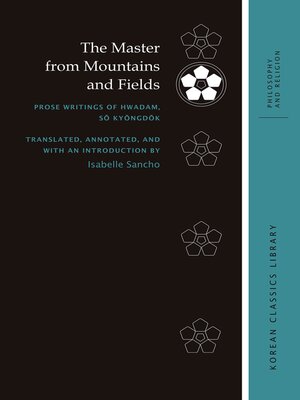The Master from Mountains and Fields
ebook ∣ Prose Writings of Hwadam, Sŏ Kyŏngdŏk · Korean Classics Library: Philosophy and Religion
By Isabelle Sancho

Sign up to save your library
With an OverDrive account, you can save your favorite libraries for at-a-glance information about availability. Find out more about OverDrive accounts.
Find this title in Libby, the library reading app by OverDrive.



Search for a digital library with this title
Title found at these libraries:
| Loading... |
The Master from Mountains and Fields is a fully annotated translation of the prose texts from the "collected works" of Sŏ Kyŏngdŏk (1489–1546), an influential Confucian scholar from the early Chosŏn period (1392-1910). A native of Songdo (also known as Kaesŏng) in present-day North Korea, Sŏ has loomed large in the Korean cultural imagination and appeared as an exceptional sage and popular hero in numerous tales, dramas, and films, yet his writings are little known outside the academic milieu.
Also called Master Hwadam, Sŏ embodied an archetype of the secluded scholar who remains hidden in "mountains and forests" to devote himself to his studies. Held in esteem in both South and North Korea today (a notable exception in contemporary studies on Chosŏn Neo-Confucianism), Sŏ and his ideas about Vital Energy influenced the great Korean Neo-Confucian debates of the sixteenth and seventeenth centuries surrounding the psychophysiological origins of morality as well as various non-orthodox intellectual trends in the late Chosŏn. His thought is fundamentally rooted in the cosmology based on the exegesis of the Book of Changes and follows the teachings of various early Chinese Neo-Confucian thinkers; it presents a vivid example of the eclectic nature of ideas and intellectual trends coexisting within what is generically called Neo-Confucianism out of convenience.
This volume presents the first English translation of all prose writings attributed to Sŏ and most of the peritexts from his posthumously published collection Hwadam chip. It reflects the importance of literary compilations (munjip) in the intellectual history of Chosŏn and the complex process of the making of Confucian masters in Korea. Sŏ's prose works are concise and diverse and offer a glimpse at an author who thwarts stereotyping; an introduction and annotations provide further context. The lengthy endnotes that accompany each text make this a useful handbook for anybody interested in Chosŏn Korea and Confucianism, from students in East Asian and Korean studies to specialists in literary Chinese (hanmun) or East Asian intellectual history.






